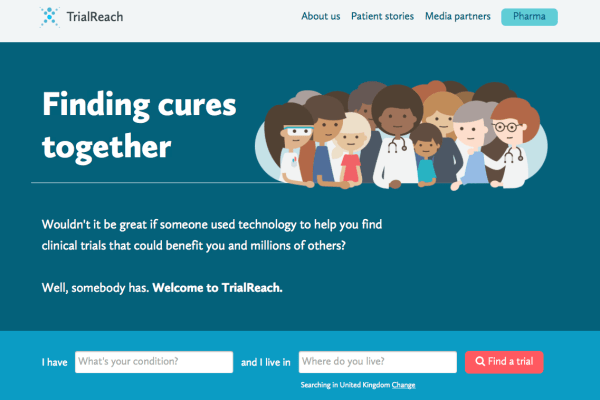TrialReach is an interesting startup on a number of fronts. Firstly, the company is based in London but does most of its business in the “fast-moving” U.S. healthcare market. Secondly, and more significantly, it’s using technology to solve a very human problem and one of the biggest obstacles in medical research: matching the right patients with the right clinical trials, which in turn should help speed up the development of new treatments and ultimately save lives.
To further that mission, TrialReach has closed a new $13.5 million Series B round of funding. The investment is being led by Smedvig Capital, with participation from existing backers Amadeus Capital and Octopus Investments, money it will use to support the growth of its clinical trial platform and to continue expansion across the pond.
The specific problem that TrialReach’s platform aims to tackle is that many clinical trials go unfulfilled, rendering them worthless, or are significantly delayed, simply because not enough patients can be signed up. This is partly an awareness problem — many patients who have exhausted existing treatments don’t know that clinical trials are an option — but is also a data problem.
That’s because clinical trials are defined in a document called ‘protocol’, a scientific paper typically over 100 pages long, which isn’t intended to be read by patients, but is written for physicians and healthcare regulators.
Meanwhile, the part relating to which patients might qualify for the trial — the inclusion/exclusion criteria — consists of free-form text, meaning that there’s no simple way to quickly (and automatically) use that data to match patients with trials.
To solve this, TrialReach’s platform is designed to aggregate and, crucially, structure clinical trial listings data, making it ‘machine readable’, so that patients can be “smart matched” with specific trials that are relevant to their condition and to which they may actually qualify.
In practical terms, this means that a patient will be able to search for clinical trials being conducted locally, simply by inputting some data about their condition and answering a series of questions that will enable the system to intelligently drill down and filter out the trials that don’t match, until it finds one that does.
In addition, as Electronic Medical Records take off, healthcare providers could plug their patient data into TrialReach’s platform at scale, enabling groups of patients to be autimatically matched to potentially suitable clinical trials.
Or another way to think about TrialReach is that it is building a meta search engine for clinical trials. That makes even more sense when you consider that co-founder and CEO Pablo Graiver — who tells me he’s made 10 trips to the U.S. in the last 12 months — was previously VP Business Development Europe at travel meta search engine Kayak.
 In a call, Graiver told me that TrialReach is part of a wider trend in healthcare that is seeing patients take more control of their treatment. The internet means that there is a greater amount of information available to patients than ever before, through searching online or shared in various online patient communities. And while empowering patients by giving them more direct access to medical information has been resisted by some parts of the healthcare industry, the cat is well and truly out of the bag, he says.
In a call, Graiver told me that TrialReach is part of a wider trend in healthcare that is seeing patients take more control of their treatment. The internet means that there is a greater amount of information available to patients than ever before, through searching online or shared in various online patient communities. And while empowering patients by giving them more direct access to medical information has been resisted by some parts of the healthcare industry, the cat is well and truly out of the bag, he says.
To that end, TrialReach is already working with leading health organizations, including the World Health Organization, and claims that “three quarters of the top twenty pharmaceutical companies” are using its platform to support their clinical trials. In addition, the UK startup says it reaches “millions” of patients online through partnerships with health portals including Healthline, Everyday Health and CenterWatch, as well as patient networks such as WEGO Health and CureClick.
